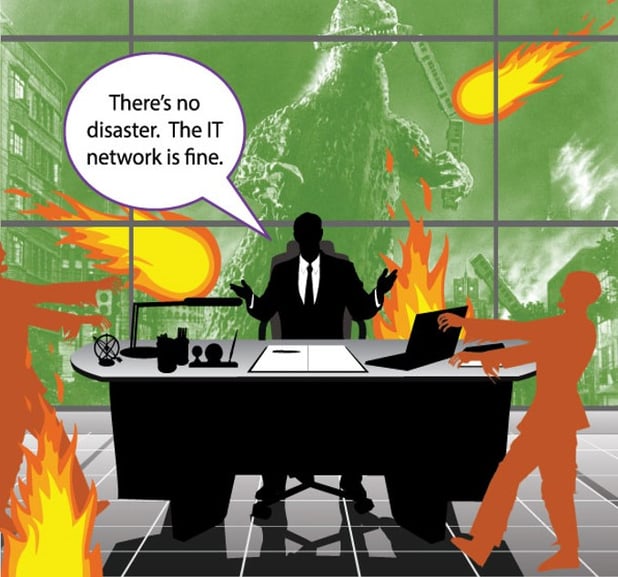…But the Network’s Up (Business Continuity is only for IT, right?)
Resilience, organizational resilience, cybersecurity, business continuity, disaster recovery

You have a great business continuity plan. You analyzed your network, you eliminated all the single points of failure, all your departments defined RTOs for all their systems, you have continuous cloud backup, and you have a warm site waiting just in case your data center gets a cootie infestation. Good work!
Tomorrow, your company gets hit by the Antarctic Creeping Crud (ACC) pandemic burning through North America. Thirty percent of your staff is down for the next four weeks, and another twenty percent won’t come in because they’ve heard that one in ten people with ACC become zombies.
Your network’s running fine. Your business is about to go under because you have only half your staff for a month. Wait… that wasn’t in your BC plan?
Business Continuity: It’s not just for IT, seriously
There’s nothing in “business continuity” that says “only for IT.” None of the Professional Practice Subject Areas for the CBCP certification mention IT. Of the four BC disciplines (Incident Management, Technology Recovery, Security Management, Business Recovery), only one is about technology. So why do so many companies think that business continuity is only about IT?
There are plenty of things that can happen to your business that aren’t about your computers.
- Your headquarters building burns down.
- A flood leaves a foot of toxic mud in your primary production facility.
- A hurricane wrecks all your stores in South Florida.
- Your largest supplier suddenly goes out of business.
- e coli shows up in your new line of Tangelo Yogurt Pops.
- That ACC pandemic cuts your workforce by 30-50% and turns your CEO into a zombie.
Who’s planning for these problems? Anyone? If not, you’ll be able to turn over a working IT infrastructure to whomever buys your firm out of bankruptcy.
I work in the public sector. We talk about “continuity of operations” (COOP) and “emergency management.” When the flag goes up, our customers – our city’s residents and visitors – won’t be impressed by a two-hour RTO for our business-license database if we have a two-year RTO for our City Hall, and no alternate locations. (For that matter, neither will yours.) Over the past year, I’ve had to figure out how to move our entire police department with four hours’ warning, whether we can take over a local school to become a new Civic Center, and how to deliver bottled water to over eighty thousand people a day after an earthquake. Long-shot situations? Yes, indeed. But we have to do it; letting the city government go belly-up isn’t an option.
CONCLUSION:
I’m going to go out on a limb and say that no business ever died because its IT infrastructure failed for a few days. Airlines, banks, telecom companies, retail chains – all have had well-publicized IT disasters and have survived. What kills businesses (especially small- and medium-sized ones) are lost facilities, staff crises, scandals, customer exoduses, supply interruptions, long-term strikes, and catastrophic executive decision-making. If you’re not planning for these events… well, what exactly are you planning for?
 After all, I’m sure Chipotle’s computers are working just fine.
After all, I’m sure Chipotle’s computers are working just fine.
Editors note: Want to learn more about Business Continuity Consulting and BCM solutions? Download this free brochure.
Resilience, organizational resilience, cybersecurity, business continuity, disaster recovery


